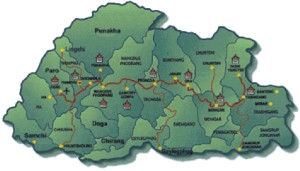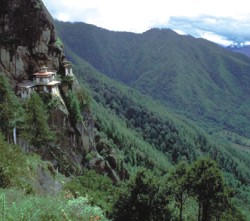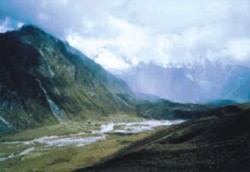|
|
Breathless in Bhutan
Lamia Rashid
 This
was my first trek, but certainly not my last. In Bhutan,
you can do some of the most difficult treks in the world
but as a beginner, I tried the sixty-five kilometers Druk
Path trek from Paro to Thimpu. While physical exertion is
not normally my idea of a holiday, I could think of no better
way to spend the one precious week I had off from all my
adult responsibilities. This
was my first trek, but certainly not my last. In Bhutan,
you can do some of the most difficult treks in the world
but as a beginner, I tried the sixty-five kilometers Druk
Path trek from Paro to Thimpu. While physical exertion is
not normally my idea of a holiday, I could think of no better
way to spend the one precious week I had off from all my
adult responsibilities.
I won't get into the details here of how
difficult it was to convince the travel agent that I, as
a Bangladeshi woman, wanted to go to Bhutan by myself, during
the off-season, not on a sightseeing tour (read shopping),
but on a trek, in the mountains, sleeping at night in a
tent. It sound crazy, but apparently, such a thing had never
been done (or at least requested) and if it has, could whoever
has done it please identity yourself -- I'd love a chat?
It was well worth the two weeks of to-ing and fro-ing with
the travel agent to realise my plan.
I flew to Bhutan in late August this year
and spent the first half of my week trekking and the second
half sightseeing. My trek started from outside Paro Museum
around nine in the morning on a bright sunny day. With me
I had my guide, whom met the day before and trusted immediately;
the cook, a man with a permanent smile and the gumdrop cheeks
that a lot of people get up in the mountains; the horseman,
who looked more like a cow-boy; and his horses. The four
small horses carried the tents, 3 days worth of supplies,
and our few personal effects they were not there to carry
any of us -- we had our feet for that purpose. Two tiny
trainee ponies also came along, if not for the experience,
then surely for the tasty mountain grass.
We climbed gradually up to 12,000 feet that
day, with an hour break for lunch and a nap in a flowering
meadow. The cook and horses would go on ahead, so when we
reached the camp spot in the early evening, the tents were
all set up and hot chocolate and cream biscuits were laid
out and waiting. (This was my kind of trekking experience!)
I spent the evening chatting with my Bhutanese mates and
retired early, I guess, not having worn a watch.
 The
next day was going to be hard. Plus, I hadn't slept very
well, not having yet adjusted to sleeping in a tent in the
middle of the mountains. While the first day had been relatively
rain-free, the second day was downright damp -- so much
so that we had to cut short our lunch break. But I was so
exhausted, I managed a doze despite the dampness, sitting
upright in my raincoat and hat with my face buried in my
arms. We spent the first half of the day slipping down,
down, down the mountain, only to spend the second half climbing
steeply up again above the tree line. I had warned the guide
that uphill was going to be rough for me, unfit as I know
myself to be, and he was well prepared with torchlight in
case we should fail to reach the campsite before dusk. As
it turned out, the downhill was much harder than uphill
and we made it to camp just after dusk without the aid of
a torch. I felt victorious! The
next day was going to be hard. Plus, I hadn't slept very
well, not having yet adjusted to sleeping in a tent in the
middle of the mountains. While the first day had been relatively
rain-free, the second day was downright damp -- so much
so that we had to cut short our lunch break. But I was so
exhausted, I managed a doze despite the dampness, sitting
upright in my raincoat and hat with my face buried in my
arms. We spent the first half of the day slipping down,
down, down the mountain, only to spend the second half climbing
steeply up again above the tree line. I had warned the guide
that uphill was going to be rough for me, unfit as I know
myself to be, and he was well prepared with torchlight in
case we should fail to reach the campsite before dusk. As
it turned out, the downhill was much harder than uphill
and we made it to camp just after dusk without the aid of
a torch. I felt victorious!
I
am not eloquent enough to do justice to the natural beauty
that was all around me. What I can describe is the smell.
Quite simply, it was the smell of nothing -- of pure, clean,
moving air. I know that we Bangalis are obsessed with catching
a bit of bathash, but for the Bhutanese, bathash
is an essential element of life and religion. Bathash
moves the prayer flags and with each motion, merit is accrued
for the prayer. Another source of motion, and consequently
merit, is flowing water. Throughout my trek, whenever I
needed a bit of cooling, I could run my hands alternately
through trickling steams and gushing torrents of water-falls.
Its not surprising that Bhutan is a net exporter hydraulic
energy.
The second night, we camped beside a quiet misty lake. I
slept much better. Dinner included chillies so large, they're
vegetables and fresh spring onions that my guide picked
on our way up the mountain while waiting around during my
numerous breaks. I'm a vegetable lover, and I loved the
fresh, crispy vegetables the cook made up, in cheese sauce
and served with a reddish rice. In the morning of my last
day, we started out around eight-thirty after the usual
bowl of warm water for my face and a vegetable omelette
for my stomach. It was cloudy but not as wet as the previous
day. Today, we climbed to our highest point of 13,000 feet
before stopping for lunch at another lake.
 The
lakes here were pools of stillness reflecting the mountains
all around them. Our lunch lake was so clear, you could
see right through to the jagged rocks at its bottom. The
sun came through the clouds and I looked at the only creatures
around beside us. I thought, how lucky these grazing cows
were and how envious Bangladeshi cows would be to know how
much space and fresh grass each of their Bhutanese counterparts
have as a matter of course. After lunch, I had a long final
stretch of downhill to the Thimpu valley. I paid for taking
it easy on the first leg of the descent. We ended up walking
'till well after dusk and by the end, I couldn't see anything
but my guide's feet in front of me to lead the way down.
Again, I realised that downhill was much, much harder than
uphill! When it was all over, I was grateful that something
other than my own two feet (i.e. the attendant car) was
going to transport me from the outskirts of Thimpu to the
hotel. The
lakes here were pools of stillness reflecting the mountains
all around them. Our lunch lake was so clear, you could
see right through to the jagged rocks at its bottom. The
sun came through the clouds and I looked at the only creatures
around beside us. I thought, how lucky these grazing cows
were and how envious Bangladeshi cows would be to know how
much space and fresh grass each of their Bhutanese counterparts
have as a matter of course. After lunch, I had a long final
stretch of downhill to the Thimpu valley. I paid for taking
it easy on the first leg of the descent. We ended up walking
'till well after dusk and by the end, I couldn't see anything
but my guide's feet in front of me to lead the way down.
Again, I realised that downhill was much, much harder than
uphill! When it was all over, I was grateful that something
other than my own two feet (i.e. the attendant car) was
going to transport me from the outskirts of Thimpu to the
hotel.
Now, of course, I miss it again. The effect
of eyefuls of green forest and blue skies, nosefuls of light,
clean fresh air and handfuls of cool, soft, flowing water
on one's soul is truly compelling. I want to go live in
Bhutan. Does anyone have job for me there please?
|

 This
was my first trek, but certainly not my last. In Bhutan,
you can do some of the most difficult treks in the world
but as a beginner, I tried the sixty-five kilometers Druk
Path trek from Paro to Thimpu. While physical exertion is
not normally my idea of a holiday, I could think of no better
way to spend the one precious week I had off from all my
adult responsibilities.
This
was my first trek, but certainly not my last. In Bhutan,
you can do some of the most difficult treks in the world
but as a beginner, I tried the sixty-five kilometers Druk
Path trek from Paro to Thimpu. While physical exertion is
not normally my idea of a holiday, I could think of no better
way to spend the one precious week I had off from all my
adult responsibilities. The
next day was going to be hard. Plus, I hadn't slept very
well, not having yet adjusted to sleeping in a tent in the
middle of the mountains. While the first day had been relatively
rain-free, the second day was downright damp -- so much
so that we had to cut short our lunch break. But I was so
exhausted, I managed a doze despite the dampness, sitting
upright in my raincoat and hat with my face buried in my
arms. We spent the first half of the day slipping down,
down, down the mountain, only to spend the second half climbing
steeply up again above the tree line. I had warned the guide
that uphill was going to be rough for me, unfit as I know
myself to be, and he was well prepared with torchlight in
case we should fail to reach the campsite before dusk. As
it turned out, the downhill was much harder than uphill
and we made it to camp just after dusk without the aid of
a torch. I felt victorious!
The
next day was going to be hard. Plus, I hadn't slept very
well, not having yet adjusted to sleeping in a tent in the
middle of the mountains. While the first day had been relatively
rain-free, the second day was downright damp -- so much
so that we had to cut short our lunch break. But I was so
exhausted, I managed a doze despite the dampness, sitting
upright in my raincoat and hat with my face buried in my
arms. We spent the first half of the day slipping down,
down, down the mountain, only to spend the second half climbing
steeply up again above the tree line. I had warned the guide
that uphill was going to be rough for me, unfit as I know
myself to be, and he was well prepared with torchlight in
case we should fail to reach the campsite before dusk. As
it turned out, the downhill was much harder than uphill
and we made it to camp just after dusk without the aid of
a torch. I felt victorious! The
lakes here were pools of stillness reflecting the mountains
all around them. Our lunch lake was so clear, you could
see right through to the jagged rocks at its bottom. The
sun came through the clouds and I looked at the only creatures
around beside us. I thought, how lucky these grazing cows
were and how envious Bangladeshi cows would be to know how
much space and fresh grass each of their Bhutanese counterparts
have as a matter of course. After lunch, I had a long final
stretch of downhill to the Thimpu valley. I paid for taking
it easy on the first leg of the descent. We ended up walking
'till well after dusk and by the end, I couldn't see anything
but my guide's feet in front of me to lead the way down.
Again, I realised that downhill was much, much harder than
uphill! When it was all over, I was grateful that something
other than my own two feet (i.e. the attendant car) was
going to transport me from the outskirts of Thimpu to the
hotel.
The
lakes here were pools of stillness reflecting the mountains
all around them. Our lunch lake was so clear, you could
see right through to the jagged rocks at its bottom. The
sun came through the clouds and I looked at the only creatures
around beside us. I thought, how lucky these grazing cows
were and how envious Bangladeshi cows would be to know how
much space and fresh grass each of their Bhutanese counterparts
have as a matter of course. After lunch, I had a long final
stretch of downhill to the Thimpu valley. I paid for taking
it easy on the first leg of the descent. We ended up walking
'till well after dusk and by the end, I couldn't see anything
but my guide's feet in front of me to lead the way down.
Again, I realised that downhill was much, much harder than
uphill! When it was all over, I was grateful that something
other than my own two feet (i.e. the attendant car) was
going to transport me from the outskirts of Thimpu to the
hotel.